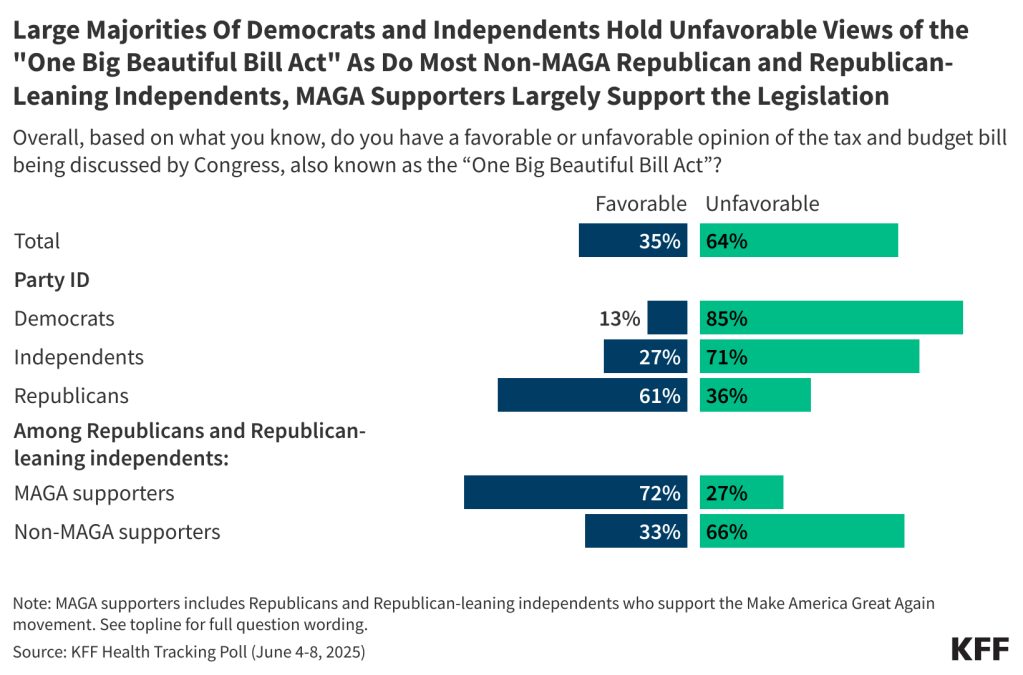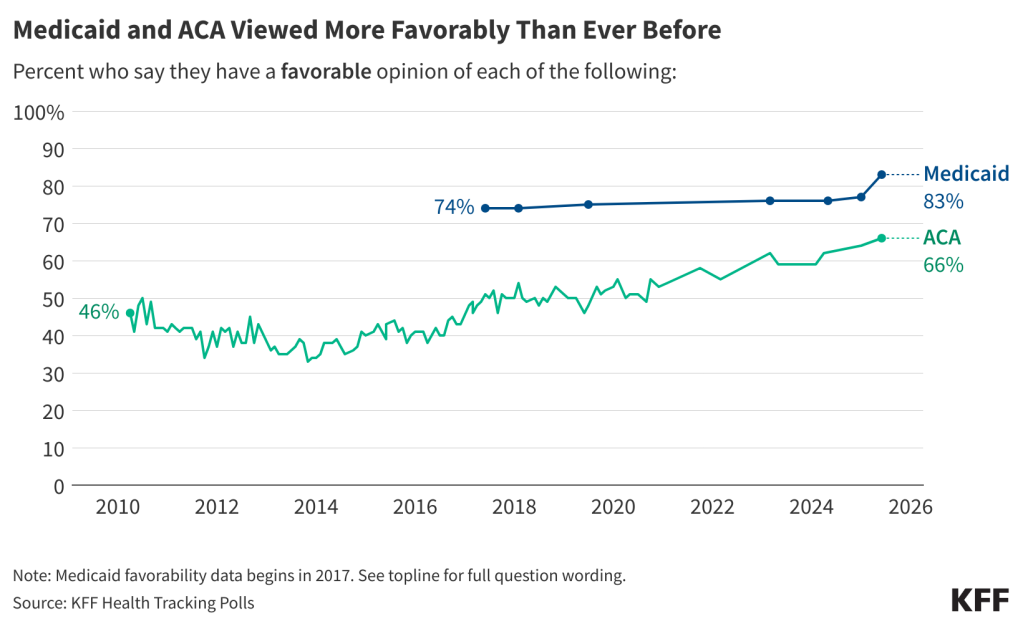
The independent source for health policy research, polling, and news.
Poll: Public Views “Big Beautiful Bill” Unfavorably by Nearly a 2-1 Margin; Democrats, Independents and Non-MAGA Republicans Oppose It, While MAGA Supporters Favor It; Favorability Erodes When People Hear About Possible Health Impacts
Popularity of Medicaid and the ACA Reach Record Highs Amid Congressional Debate
Medicaid Work Requirements Are Generally Popular, But Arguments Can Shift Views
Nearly two-thirds (64%) of the public holds unfavorable views of the “One Big Beautiful Bill” passed last month by the House, nearly twice the share who view the bill favorably (35%), a new KFF Health Tracking Poll finds.
The budget reconciliation bill that includes tax and budget cuts – much of which affect health care – is viewed unfavorably by large majorities of Democrats (85%) and independents (71%), but favorably by six in 10 Republicans (61%).
Among Republicans and Republican-leaning independents who identify as supporters of President Trump’s Make America Great Again (MAGA) movement, a large majority (72%) view the bill favorably. In contrast, most Republicans and Republican-leaning independents who don’t identify as MAGA supporters view the bill unfavorably (66%).

When people hear facts and arguments about the bill’s impact on health care, support shrinks and opposition grows, including among MAGA supporters.
For example, after being told that the bill would decrease funding for local hospitals, the share with favorable views falls to 21% and unfavorable views rise to 79%. Similarly, after being told that the bill would increase the number of people without health insurance by about 10 million, support falls to 25% and opposition rises to 74%.
Among MAGA supporters, support drops by more than 20 percentage points after hearing each of the two arguments, resulting in less than half in the group viewing the law favorably.
“The public hasn’t had much time to digest what’s in the big, beautiful, but almost incomprehensible bill as it races through Congress, and many don’t have a lot of information about it,” KFF President and CEO Drew Altman said. “Our poll shows that views toward the bill and its health-care provisions can shift when presented with more information and arguments about its effects, even among MAGA supporters.”
As Congress debates significant reductions in federal spending on Medicaid and the Affordable Care Act (ACA), the poll finds the public views the two programs more favorably than ever before.
Regarding Medicaid, 83% of the public now views the Medicaid program favorably, including large majorities of Democrats (93%), independents (83%), and Republicans (74%). That’s up from 77% in January, with the biggest jump occurring among Republicans. Unfavorable views of the program now stand at 17%, down from 23% in January.
Similarly, two-thirds (66%) of the public now have favorable views of the ACA, the highest level of support recorded in KFF polls since the law’s enactment in 2010. Favorable views of the ACA have been on the rise since 2017 during an unsuccessful attempt by Congressional Republicans to repeal the law during President Trump’s first term.
Views of the ACA remain split along partisan lines, with most Republicans (63%) holding unfavorable views, and most Democrats (94%) and independents (71%) holding favorable ones.

Medicaid Work Requirements Are Generally Popular, But Arguments Can Shift Views
The poll also gauges the public’s views on a provision in the House bill that would require most adult Medicaid enrollees to prove that they are working, engaged in other qualified activities, or meet exemption criteria, to keep their coverage.
The poll finds two-thirds of the public – including the vast majority of Republicans (88%) and MAGA supporters (93%), and half (51%) of Democrats – initially support requiring nearly all adults with Medicaid coverage to prove they are working, looking for work, in school, or doing community service, with exceptions for caregivers and people with disabilities.
However, attitudes toward this provision can shift dramatically when people are presented with facts and arguments related to its impact.
For example, when told most adults with Medicaid are already working or unable to work, and they could potentially lose coverage due to the challenges in providing paperwork to prove it, about half of supporters change their view, resulting in nearly two-thirds of adults (64%) opposing Medicaid work requirements and a third (35%) supporting it.
Similarly, overall support for work requirements drops to 40% after supporters hear that the policy would not have a significant impact on employment and would increase state administrative costs.
In the other direction, overall support increases to 79% when opponents of Medicaid work requirements hear the argument often made by supporters that such a requirement could save money and help fund Medicaid for groups like the elderly, people with disabilities, and low-income children.
The poll also gauges views on other health care provisions in the bill:
- A narrow majority (54%) opposes a provision that would reduce federal funding to states that use state money to expand health coverage to immigrants, including some undocumented immigrants, who don’t qualify for Medicaid. Just under half (45%) support the provision, including three-quarters of MAGA supporters (76%).
- Two-thirds (67%) oppose a provision that would stop all payments to Planned Parenthood and other clinics for services such as birth control and health screenings that they provide to people on Medicaid if the clinics also offer abortion services. A majority (62%) of MAGA supporters favor the provision, while Republican women are split (51% oppose, 49% support).
- Nearly two-thirds (65%) oppose provisions in the bill that would reduce ACA Marketplace enrollment by shortening the annual sign-up period and requiring more paperwork to verify people’s eligibility for coverage. Most Democrats (79%) and independents (68%) oppose the changes, while Republicans are split (51% support, 47% oppose). A narrow majority (55%) of MAGA supporters favor the change.
Most of the Public, Including Those who Rely on Medicaid, Worry About Bill’s Impact
Among the public overall, 72% say they are concerned that more adults and children will become uninsured because of the bill’s changes to Medicaid and the ACA. This includes large majorities of Democrats (90%) and independents (77%), and nearly half of Republicans (48%).
Among people who have a current personal or family connection to the Medicaid program, nearly 8 in 10 (77%) say they are concerned about a potential increase in the uninsured.
People under age 65 with Medicaid coverage also say they would face significant hardships if they were to lose their coverage. Without Medicaid, more than half say it would be “very difficult” to afford their prescription medications (68%), afford to see a health care provider (59%) or get and pay for another form of coverage insurance coverage (56%).
In addition, most Medicaid enrollees say that losing Medicaid coverage would have a “major impact” on their financial well-being (75%), overall quality of life (69%), their mental health (66%), and their physical health (60%). Four in ten say it would have a “major impact” on their ability to work.
Designed and analyzed by public opinion researchers at KFF, this survey was conducted June 4-8, 2025, online and by telephone among a nationally representative sample of 1,321 U.S. adults in English and in Spanish. The margin of sampling error is plus or minus 3 percentage points for the full sample. For results based on other subgroups, the margin of sampling error may be higher.